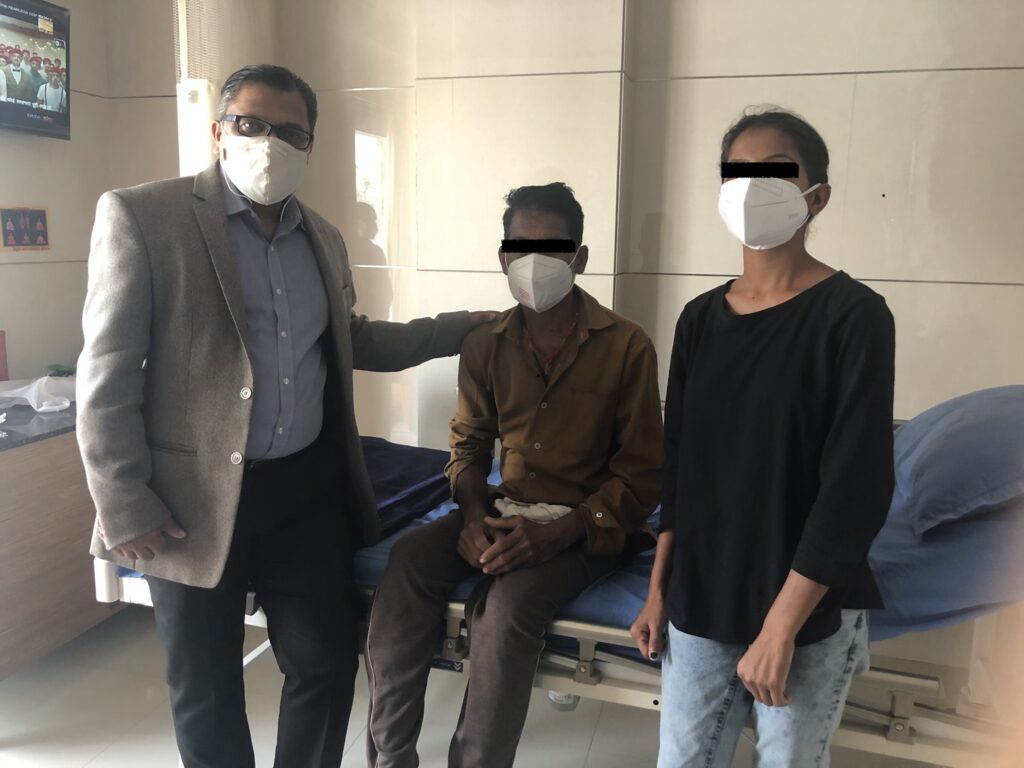- March 3, 2023
- By: Dr. Subodh Kamble
- No Comments
SAVING THE KIDNEY WHILST REMOVING THE KIDNEYCANCER THROUGH A KEYHOLE! – Retroperitoneal Laparoscopic Partial Nephrectomy.
It is gratifying to be the first one in South Gujarat to perform a laparoscopic #clampless #Retroperitoneal #PartialNephrectomy. Retroperitoneal laparoscopic partial nephrectomy is a keyhole surgery from the back without entering abdominal cavity hence without disturbing abdominal organ. I am pleased to have successfully performed Retroperitoneal Partial Nephrectomy (removed a part of kidney from the backside for a #KidneyCancer instead of removing whole kidney and without disturbing the abdominal organs and cavity) in a 58-year-old man.
Needless to say, these types of surgeries are usually extremely difficult surgeries to perform due to the limited space availability and are no doubt technically challenging. I am proud to say that I am amongst the only two Urologists who performs laparoscopically (keyhole) Partial Nephrectomy in South Gujarat and only surgeon to perform retroperitoneal partial Nephrectomy.
Most importantly this surgery was performed #clampless meaning I did not stop the blood supply to the kidney whilst cutting part of the kidney with a tumour. It is also called as a “#clampless
partial nephrectomy” in surgical terminology. Clamp less partial Nephrectomy are extremely rarely performed in India, so it is like a cherry on the cake making it a clamp less surgery.
I had performed many transperitoneal (through the abdominal cavity) laparoscopic and open kidney surgeries in India, but this was my first retroperitoneal (from back) keyhole surgery in India. I have huge experience in laparoscopic kidney surgeries both trans and retroperitoneal including robotic surgery in UK and Australia and I am keen to perform more such retroperitoneal partial and total nephrectomies in India.
A 58-year-old gentleman met me in my regular clinic, presented with a mass in the lower part of right kidney Right lower pole. This was diagnosed on the CT scan following his complaint of pain on the same side. He was initially sent to Baroda by a local urologist and was advised an open transabdominal surgery. Upon reading about me he came to meet me in the clinic to discuss the problem further. I put him and his family’s mind at rest by explaining the diagnosis, my management and the keyhole surgery I could offer them. The family had put the complete faith in me and in my urological as well as uro-oncosurgical expertise. We jointly discussed surgical options and agreed Laparoscopic Rectoperineal Partial Nephrectomy.
At the end of the day a happy, fully satisfied patient and the relatives is what I aim for. I would give further update when we receive the histology report of the tumour and when I follow him up in the clinic.
There are many benefits of Retroperitoneal Partial Nephrectomy. By performing this type of surgery, bowel manipulation and irritating effects of carbon dioxide on the gastrointestinal tract are avoided. Due to this the incidence of postoperative ileus (bowel going to sleep) and time to refeeding is far less. By performing this type of surgery, the risk of peritonitis (infection in the abdominal cavity) or peritoneal seeding (cancer cells dropping in the abdominal cavity) are avoided. In patients who have undergone previous abdominal surgery or radiation laparoscopic (keyhole) trans abdominal surgery could be extremely difficult or impossible, therefore an open surgery remains as an option as these patients have intra-abdominal adhesions where bowel can be stuck to each other and the covering of the abdomen. However, patients can still be offered Laparoscopic (keyhole) surgery through the retroperitoneal approach which is one of the biggest advantages of this type of surgery. The retroperitoneal approach has advantage when the kidney vessels are abnormal (renal vascular anomalies) and it provides early vascular control which is crucial. This approach is beneficial in the morbidly obese patient.
MY ADVICE:
• If you notice blood in your urine (colour of urine may be pink, red or cola coloured) then see a Urologist like me who has expertise in dealing with urological cancers.
• If you pain in your back or side that remains constant, if you have gone off your food, if you are losing weight without any particular reason, if you feel tired or look pale then get yourself examined and investigated.
• If you are more that 60 years of age, if you are a smoker, if you are overweight (Obese) then you may have probability of developing kidney cancer.
• People on kidney dialysis or having treatment for kidney failure are also susceptible to develop kidney cancer.
• If you have high blood pressure (hypertension) or if you have kidney cancer in your family, then please get yourself checked.
• Please give up smoking, try to maintain healthy weight and keep your blood pressure under control.
Most importantly, don’t let the silent killer hunt you down! Be safe, be sound and always remember that early detection is your best protection.

